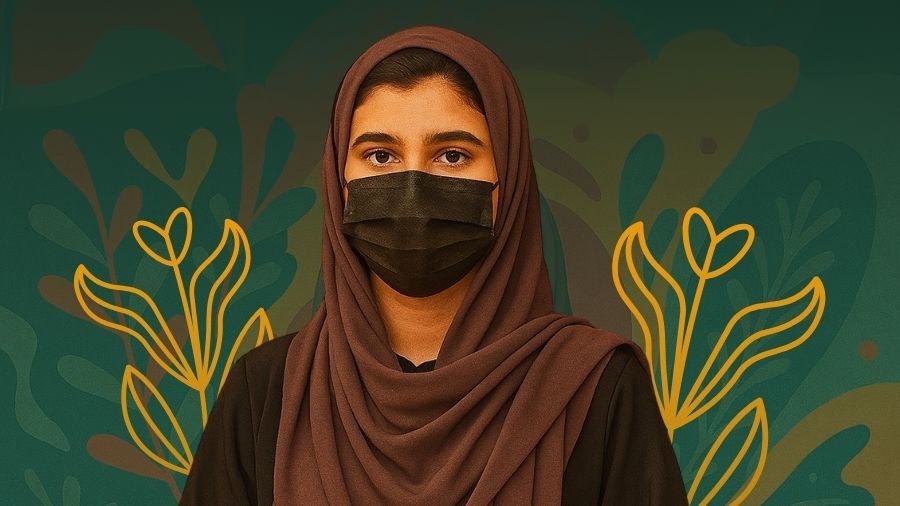
In Bannu, a small city in southern Khyber Pakhtunkhwa (KP), internet access didn’t always work. Opportunities for women, especially in technology, were even less reliable.
Growing up, Tabinda Qudrat seldom saw women working outside the home, if at all. Fewer still talked about coding, design, or innovation. By the time she finished her undergraduate degree in Computer Science, pursuing her dream of a career in tech felt impossible. Until a window of opportunity opened up.
Tabinda heard about the KP Women’s Civic Digital Internship, a remote program launched by Code for Pakistan and the Khyber Pakhtunkhwa Information Technology Board (KPITB), and she applied without a second thought.
What Tabinda didn’t know at the time was that the program was designed especially for young women like her — women who had completed their bachelor's degrees but, due to the quality of courses taught in remote areas, were often not up to date with the latest industry skills. It was built for girls who couldn’t physically attend the many tech-related internships or skill trainings offered in major cities of Pakistan — many held back by family constraints, the costs and logistics of traveling without a male family member, and the demands of managing homes, marriages, and, in some cases, children.
"It was surreal," she says. "I couldn't believe I was able to do this without leaving my house."
Working from home meant battling blackouts and unstable internet, especially in remote parts of KP. Luckily, the program was designed to address exactly these barriers. As part of its support model, participants received internet devices sponsored by Zong, ensuring that connectivity would not block anyone’s potential.
Weekly calls with a dedicated mentor exposed Tabinda to ideas she had never encountered before — like open data, civic innovation, and freelancing platforms. Speaker sessions with women leaders in tech widened her horizons even further.
She also received basic training on how to use LinkedIn — a platform she now frequently uses to express herself and share her accomplishments. ( You can view her profile here)
During her internship, Tabinda collaborated with Fellows from the KP Government Innovation Fellowship Program — a prestigious, full-time, in-person, six-month program that pairs technologists with government departments to solve civic challenges. The Fellowship, a decade-long collaboration between Code for Pakistan and the Khyber Pakhtunkhwa Information Technology Board (KPITB), builds pathways for young innovators like her to drive change.
As part of the Internship, Tabinda opened her first bank account with support from the Bank of Khyber. Financial independence meant she could invest in herself: she used her stipend to fund her Master’s degree in Computer Science.
“I started to believe in a future I hadn’t dared to imagine.”
Turning knowledge into action...
When the internship ended, Tabinda began freelancing, taking on online tech projects. After completing her Master’s degree, inspired by her interaction with the Fellows during the internship, she applied for the KP Government Innovation Fellowship. She was ready to be a Fellow.
She got in.
Her father, Qudratullah Khan — a man with vision and her biggest cheerleader — packed up the family’s life in Bannu and moved them to Peshawar so she could accept the Fellowship offer. For months, he picked her up from her office — a quiet act of support in a region often bound by societal norms. Their bond is a symbol of strength, nurturing Tabinda's confidence and drive.
"He's my hero," she says in a hushed whisper.
As part of the Fellowship, Tabinda worked directly with KP government departments on high-impact civic tech projects. She helped build a:
- Gov GPT: An AI-powered chatbot delivering citizens verified answers to government questions.
- Fake News Detection Tool: A system designed to strengthen media literacy and rebuild public trust.
For the first time, she wasn’t asking for a seat at the table — she was standing at the head of it.
“I stood in government offices, presenting ideas, asking questions, being heard.”
Paying it forward...
Her siblings — inspired by her lead — enrolled in top universities in Peshawar. Her father remains an advocate for women's education within their community.
The future looks promising for this bright-eyed young woman — not because someone handed her hope, but because she actively built it.
“You didn’t just change my life,” she says.
“You changed my whole community’s idea of what women can do.”
Today, Tabinda continues to work at the intersection of technology and social impact, carving out space for others to follow.
The KP Women’s Civic Digital Internship is not only about addressing skill gaps. It is a program where every barrier faced by young women in remote parts of Pakistan is identified — and intentionally cleared — to create real opportunities for leadership and change.
Help Spark More Journeys Like Tabinda’s
Support women in civic tech today.